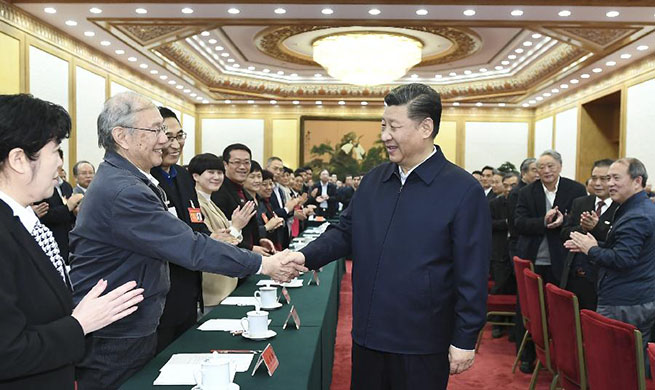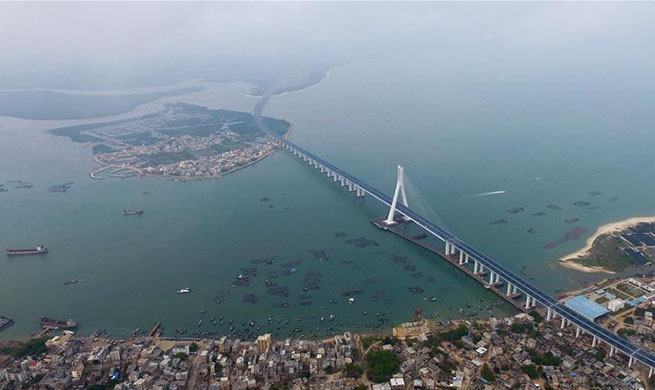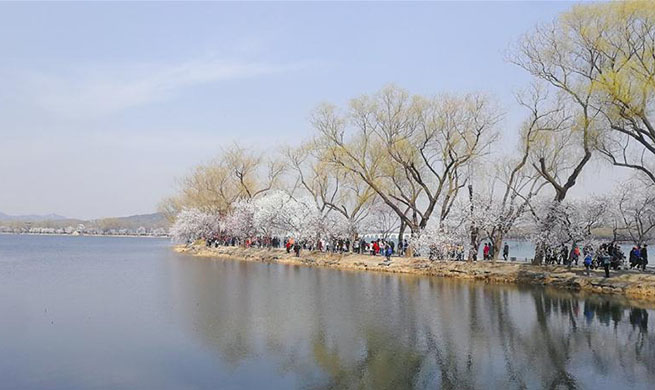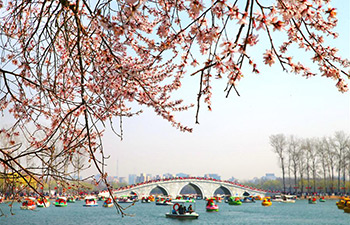NAIROBI, March 18 (Xinhua) -- From saving citizens' time, uniting families, spurring business and bringing cost of transport down, infrastructure projects built by Chinese companies across Kenya are bettering lives and boosting economic development.
The projects constructed in the last few years and some that are still on-going have become a game-changer to citizens of the east African nation who laud the Chinese not only for their meticulous work but also for completion of projects on time.
In western Kenya, the Nyamasaria interchange in Kisumu and the road linking the lakeside town to Kakamega county, built by Chinese Overseas Engineering Group Company (COVEC), and sections of which by Jiangxi Zhongmei Engineering Construction Company, have changed the face of the populous towns.
The biggest beneficiaries of the infrastructure projects are public buses and motorbike taxi operators and businesspersons.
Several kilometers away in Busia County which neighbors Kakamega, construction of Sigiri bridge by COVEC has become a big blessing for Budalang'i residents.
"Sigiri Bridge has made transport from Bunyala north to south and vice versa much easier unlike before when people had to cross River Nzoia in boats. Currently, Bunyala south and north are just one entity, yet before they appeared separate areas," said Henry Bwire, a pay TV football showroom operator in Budalang'i, Busia.
The bridge was constructed by COVEC and crosses River Nzoia which flows into Lake Victoria shared by Uganda, Tanzania and Kenya.
"The cost of transport has greatly come down on all means from bicycle taxis (boda boda) to public buses and lorries that transport construction materials like sand. Initially, one would pay up to 400 shillings (4 U.S. dollars) to be transported from the south to the north but now with no boats, charges have declined to 1.5 dollars," said Bwire.
Long-distance passenger buses plying the Nairobi-Busia route, according to him, have now extended their services to Bunyala in Busia county due to the bridge.
Vincent Omoga, retired teacher in Bunyala, thanks the bridge for allowing him to see his relatives in Bunyala South regularly.
"My great grandfather moved to the north years back but our relatives remained in the south. Over the years, due to the challenges of using the boat, I would stay for years without visiting them but it now takes me about an hour to reach them following the completion of the bridge last year," he said, adding business is booming on both sides of the bridge just months after its completion.
Staying in southern Kenya's Makueni County southeast of the capital city Nairobi, was initially an impediment to journalist Pius Makau's work since sometimes he had to take assignments in Nairobi, some 200 km away.
"Before the standard gauge railway inter-county train, I would board a public bus and take over three hours to reach Nairobi because of traffic jam on Mombasa Road. But these days, I have no problem taking up assignments in Nairobi because I board the inter-county train, which takes two hours from Kibwezi, Makueni, to Nairobi," he said.
He boards the train in Kibwezi at about 11 am and arrives in Syokimau, near Nairobi, at the main terminus at about 1 pm.
"I then pay 0.5 dollars to the city center on the commuter train. The fare on the train from Kibwezi is 4 dollars, which is almost the same as that for public buses but the train beats the vehicles because of convenience," he said.
Peter Kiarie, a boda boda rider in Kitengela, said for the first time in his life, he saw a railway line being constructed, thanks to the Chinese.
"The Chinese made me see the railway line being constructed in a seamless way that no traffic was disrupted in Kitengela. My children have now been able to see a train early in their lives unlike me and I would ensure they board," he said.
In Nairobi, the Chinese have also built several bypasses namely Eastern, Western and Northern and remodeled roads that include Thika superhighway, Outering Road, interchange at City Cabanas and expansion of Langata Road.
The roads were constructed by Chinese firms Sinohydro Limited and China Road and Bridge Corporation, among others.
Mary Nelima, an employee of Cooperative Bank, said going to Langata Road from South B has become easy because of the Southern bypass.
"You do not need to join Mombasa Road and then to Nyayo roundabout which is usually clogged with vehicles. From South B, I use the Southern bypass which connects me to Langata Road in a matter of minutes," she said.
This is the same case for citizens living in areas where the Chinese have remodeled roads. A long the newly refurbished Outering Road in Nairobi, which was done by China Wu Yi Company, business is booming.
New vehicle and motorbike spare parts shops, furniture outlets, clothes stores and salons have sprung up as people find new opportunities.
Eric Mangunyi, a senior consultant at Em-Pioneer Consultants, Nairobi, and researcher at the Walter Sisulu University, South Africa, said Chinese infrastructure projects are key to Kenya's economic progress.
"The model Kenya has taken to develop its infrastructure through Chinese financial support will certainly fast-tract development because it eases the burden on the country to fund the works. The Chinese do it using their funds and experts as Kenya is given time to repay the loans, a move that spurs development," he said.
The improved infrastructure, according to him, not only helps boost trade but also integration within the country and outside.
"If goods are able to move within Kenya easily, it means they can also reach the neighbors faster. Good infrastructure contributes to what can be termed as 'grand free trade area' increasing economic development," he said.













